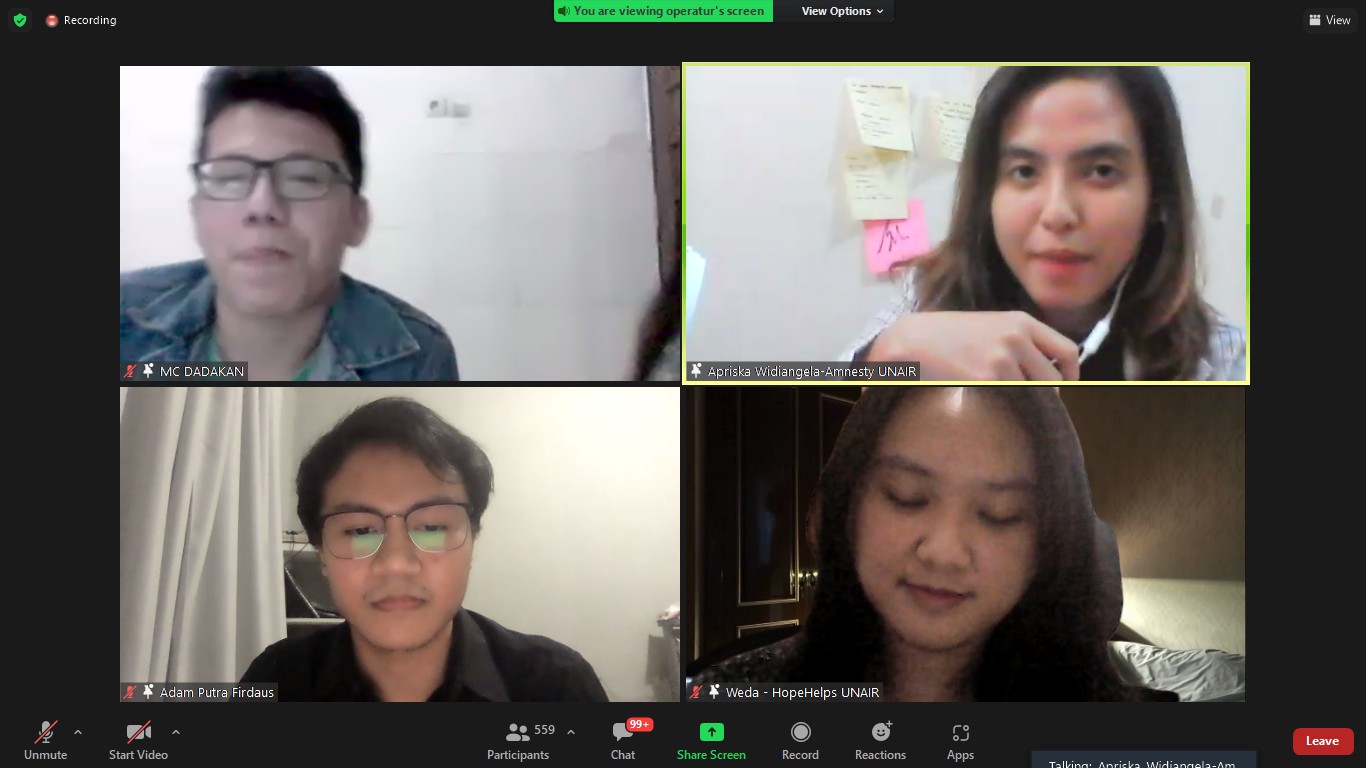UNAIR NEWS- Attended by more than 500 viewers, the Ministry of Gender Equality (KKG) of Faculty of Law’s Student Executive Board (BEM FH) UNAIR held its monthly webinar called Let’s DO IT. The sixth webinar was held on Monday evening, August 30, 2021. Organized as a talk show, the webinar discussed the extent of legal protection related to sexual violence in Indonesia.
Three speakers presented to explore the topic were Coordinator of Women and Children’s Rights, and Gender Diversity Studies Committee of Amnesty Chapter UNAIR, Apriska Widiangela; Deputy of Studies and Strategic Action Department of BEM FH UI Adam Putra Firdaus; and HopeHelps UNAIR Local Director, Khristianti Weda.
On the occasion, Angela explained that sexual violence is basically an activity that has a sexual nature and someone in the activity does not consent to it. So, in essence, sexual violence must have the impression of coercion. She emphasized that anyone can be a victim of sexual violence, regardless of sex, gender, and age.
“There are 15 types of sexual violence when citing Komnas Perempuan (National Commission on Violence Against Women). Rape, sexual intimidation, sexual harassment, forced abortion, forced marriage, and many more,” explained Angela, a student from Class of 2019 FH UNAIR.
According to Adam, the main problem with the law related to sexual violence in Indonesia is the limited recognition of sexual violence acts and formal law which still does not consider the perspective and protection of victims. Indonesia still uses the legal product from the colonial era, the Criminal Code (KUHP), which only recognize two types of sexual violence, rape and obscenity. Other legal products that regulate sexual violence are the Law on Domestic Violence and the Law on Child Protection.
“Moreover, our criminal procedure law is focused more on protecting the rights of suspects and defendants. So victims are vulnerable to secondary victimization because they have to undergo various questioning procedures, which may be traumatic because the principle of presumption of innocence must be upheld in this case. Cases of sexual violence need special handling,” said Adam.
Weda added to Adam’s explanation that this complicated landscape was exacerbated by law enforcement officers in the judicial system, which often have gender bias and do not have a victim perspective. Quite often, victims of sexual violence have to answer irrelevant and harassing questions such as “What clothes were you wearing at that time?” or “Why are you out that late?”
“So, it seems that the victim is at fault for violating the norms of decency, when in fact it is purely the fault of the perpetrator. The judicial system is exacerbated by multi-interpretative law such as the ITE law and the Pornography Law. That is why there are cases like Baiq Nuril’s. She was a temporary teacher who was harassed by her school principal, but because she tried to speak up about her experience, she was reported by the perpetrator and jailed for defamation. The President even gave an amnesty for her case,” said Weda, who is an alumnus of FH UNAIR.
Therefore, the three speakers agreed that this complicated landscape portrays the urgency for the DPR to immediately ratify the Bill on the Elimination Of Sexual Violence (PKS). Angela said that this bill would expand the scope related to acts of sexual violence. Adam explained that this bill contains special procedures in handling cases of sexual violence, such as victims are no longer burdened with evidence, and the examination must be held in a special room and have a victim-based perspective. Officers who use a harassing approach on investigation may even be penalized. Weda also said that the legal politics underlie the PKS Bill has a gender and victim perspective, and it regulates various recovery efforts for the victims.
“This is relevant considering that cases of sexual violence in Indonesia have increased by 800% in the last 12 years. However, unfortunately, the PKS Bill has not been discussed further in Senayan (DPR, ed) because many hoax-based rejections such as the PKS Bill legalizes free sex or LGBT. Furthermore, this problem has not yet become a priority, and the discussion will be repeated again in the 2021 Prolegnas (National Legislation Program). Even though as the name implies, this bill is here for the eradication of sexual violence,” concluded Weda.
Author: Pradnya Wicaksana
Editor: Nuri Hermawan (AC/AP)





